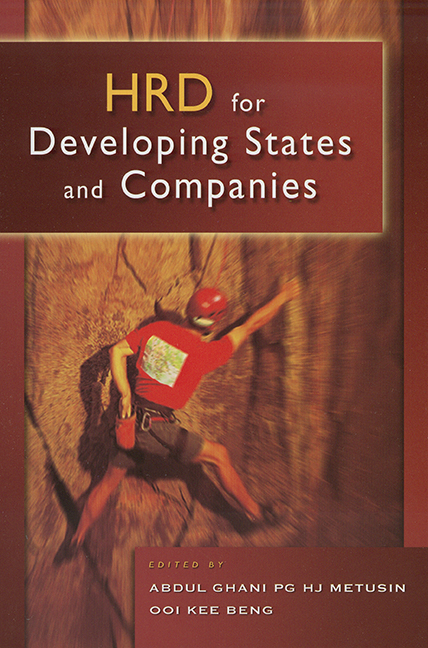Book contents
- Frontmatter
- Contents
- Foreword
- Preface
- Editorial Remarks
- Acknowledgements
- Introduction
- HRD for Statesmen
- 1 Human Resource Development in Developing Countries
- 2 Building the New HR Base — The Brunei Perspective
- 3 Managing and Achieving Excellence through HR Key Performance
- 4 Achieving an Integrated, Informed and Innovative Government for the Twenty-first Century — A Model for Emerging Markets
- 5 Human Resource Development — Challenges for the Public Services
- 6 Human-focused Management for Future Progress
- HRD Strategies for Companies
- Competence Development
- Corporate Experiences
- About the Authors
2 - Building the New HR Base — The Brunei Perspective
from HRD for Statesmen
Published online by Cambridge University Press: 21 October 2015
- Frontmatter
- Contents
- Foreword
- Preface
- Editorial Remarks
- Acknowledgements
- Introduction
- HRD for Statesmen
- 1 Human Resource Development in Developing Countries
- 2 Building the New HR Base — The Brunei Perspective
- 3 Managing and Achieving Excellence through HR Key Performance
- 4 Achieving an Integrated, Informed and Innovative Government for the Twenty-first Century — A Model for Emerging Markets
- 5 Human Resource Development — Challenges for the Public Services
- 6 Human-focused Management for Future Progress
- HRD Strategies for Companies
- Competence Development
- Corporate Experiences
- About the Authors
Summary
We are faced with unprecedented change in our lifetime. It is not so much that there have been many changes, but rather it is the rate of change imposed upon most societies that has dramatically altered our socio-economic landscape. Increasingly rapid technological changes have affected the way we live, the way we work and how we conduct ourselves towards each other. Inevitably, these changes have an important bearing on the way nations and organizations develop their human resources.
Although change is inevitable, it is not necessarily a bad thing. What is important to address is how we confront change and the challenges that come with it. If we survey the way technology has affected socio-economic patterns, we find that before the twentieth century, “change” was relatively slow in comparison to a person'slife expectancy. The time gap between the discovery of new technology and its mass application was very wide. That gap has gradually shrunk and the impact of change is being felt sooner than ever before. For instance, photography was invented in 1727, but it took 112 years before it was put to use. The telephone was invented in 1820 and it took 56 years before its application became general; television was invented in 1922 and was introduced to the general public 12 years later; the atomic bomb took only 6 years between its invention and its application in 1945; and the solar battery took only 2 years between its invention and its application in 1953.
In light of the rapid introduction of new technologies, the need for a person to keep abreast of new knowledge and skills means that periodic upgrading and retraining have become a necessity. More and more people are realizing that one-time education can no longer be regarded as an option if they wish to survive in an ever-changing world. Once upon a time, a person could adapt to a set of conditions that would remain more or less constant throughout his/her lifetime.
- Type
- Chapter
- Information
- HRD for Developing States & Companies , pp. 10 - 17Publisher: ISEAS–Yusof Ishak InstitutePrint publication year: 2005



